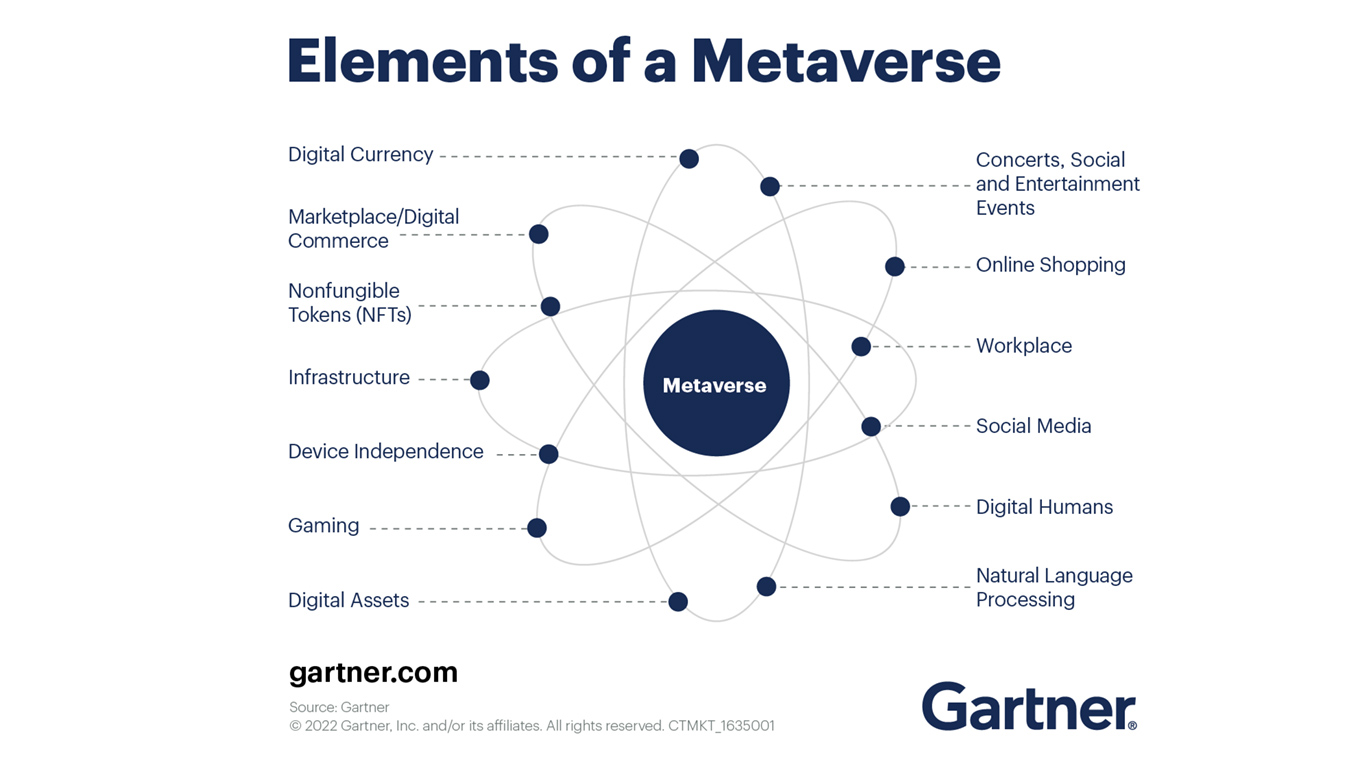Metaverse Hype to Transition into New Business Models that Extend Digital Business
By 2026, 25% of people will spend at least one hour a day in the metaverse for work, shopping, education, social and/or entertainment, according to Gartner, Inc.
“Vendors are already building ways for users to replicate their lives in digital worlds,” said Marty Resnick, research vice president at Gartner. “From attending virtual classrooms to buying digital land and constructing virtual homes, these activities are currently being conducted in separate environments. Eventually, they will take place in a single environment – the metaverse – with multiple destinations across technologies and experiences.”
Gartner defines a metaverse as a collective virtual shared space, created by the convergence of virtually enhanced physical and digital reality. It is persistent, providing enhanced immersive experiences, as well as device independent and accessible through any type of device, from tablets to head-mounted displays.
Because no single vendor will own the metaverse, Gartner expects it to have a virtual economy enabled by digital currencies and nonfungible tokens (NFTs). The metaverse will impact every business that consumers interact with every day.
It will also impact how work gets done. Enterprises will provide better engagement, collaboration and connection to their employees through immersive workspaces in virtual offices. Businesses will not need to create their own infrastructure to do so because the metaverse will provide the framework. In addition, virtual events that have gained popularity over the last 18 months will offer more collaborative and immersive networking opportunities and workshops.
“Enterprises will have the ability to expand and enhance their business models in unprecedented ways by moving from a digital business to a metaverse business,” said Resnick. “By 2026, 30% of the organizations in the world will have products and services ready for metaverse.”
The adoption of metaverse technologies is nascent and fragmented, and Gartner cautions organizations about investing heavily in a specific metaverse. “It is still too early to know which investments will be viable in the long term, but product managers should take the time to learn, explore and prepare for a metaverse in order to position themselves competitively,” said Resnick.
Gartner clients can read more in “Predicts 2022: 4 Technology Bets for Building the Digital Future” and Quick Answer: What is a Metaverse.
More information will be discussed in the complimentary Gartner webinar “Immediate and Future Metaverse Opportunities for Product Leaders.” Learn which emerging technologies can help generate ROI in the Gartner Emerging Technologies Roadmap.
การเติบโตของ Metaverse จะก่อให้เกิดโมเดลธุรกิจใหม่ ๆ ที่ช่วยขยายการทำธุรกิจดิจิทัล
การ์ทเนอร์ อิงค์ คาดการณ์ภายในปี พ.ศ. 2569 ผู้คนราว 25% ทั่วโลกจะใช้เวลาอย่างน้อยวันละ 1 ชั่วโมงไปกับการทำงาน ช้อปปิ้ง เรียนรู้ เข้าสังคมและ/หรือความบันเทิงรูปแบบต่าง ๆ ในโลก Metaverse
มาร์ตี้ เรสนิค รองประธานฝ่ายวิจัย การ์ทเนอร์ อิงค์ กล่าวว่า “ผู้ให้บริการพร้อมสร้างแนวทางการใช้ชีวิตในโลกดิจิทัลให้แก่ผู้ใช้อย่างหลากหลาย ตั้งแต่การเข้าร่วมคลาสเรียนแบบเวอร์ชวลไปจนถึงการซื้อที่ดินดิจิทัลหรือสร้างบ้านเสมือนจริง แม้กิจกรรมเหล่านี้จะดำเนินอยู่ในคนละสภาพแวดล้อม แต่ท้ายที่สุดกิจกรรมทั้งหมดจะไปรวมอยู่ในสภาพแวดล้อมเดียวนั่นคือ Metaverse ปลายทางที่รวมเทคโนโลยีและประสบการณ์หลากหลายไว้ด้วยกัน”
การ์ทเนอร์ให้นิยามของ Metaverse ว่าเป็นพื้นที่เสมือนจริงที่เปิดโอกาสให้กลุ่มคนที่มีความสนใจในเรื่องเดียวกันมาแบ่งปันใช้ร่วมกัน โดยสร้างขึ้นจากการผสมผสานความเป็นจริงทางกายภาพและดิจิทัลเข้าไว้ด้วยกันเพื่อมอบประสบการณ์ที่สมจริงยิ่งขึ้น ตลอดจนสามารถเข้าถึงผ่านอุปกรณ์ชิ้นเดียวหรืออุปกรณ์ชนิดอื่น ๆ ตั้งแต่แท็บเล็ตจนถึงจอแสดงผลแบบสวมศีรษะ
เนื่องจากไม่มีผู้ให้บริการใดที่เป็นเจ้าของ Metaverse แต่เพียงผู้เดียว การ์ทเนอร์คาดว่าจะมีรูปแบบเศรษฐกิจเสมือนจริงเกิดขึ้นและขับเคลื่อนโดยสกุลเงินดิจิทัล รวมถึงสินทรัพย์ดิจิทัล (NFTs) และ Metaverse ยังส่งผลกระทบไปถึงทุกธุรกิจที่โต้ตอบสื่อสารกับผู้บริโภคทุกวัน
นอกจากนี้ Metaverse ยังส่งผลกระทบต่อวิธีการทำงาน องค์กรต่าง ๆ จะมุ่งนำเสนอการมีส่วนร่วม ความร่วมมือกันและการเชื่อมต่อที่ดียิ่งขึ้นให้แก่พนักงานผ่านพื้นที่ทำงานเสมือนจริงแบบเวอร์ชวลออฟฟิศ โดยไม่จำเป็นต้องสร้างโครงสร้างพื้นฐานของตนเอง เพราะว่า Metaverse ได้ช่วยจัดการวางระบบให้เรียบร้อยแล้ว นอกจากนี้การจัดกิจกรรมเสมือนจริงที่ได้รับความนิยมในช่วง 18 เดือนที่ผ่านมา จะมอบโอกาสในการสร้างเครือข่ายและทำกิจกรรมต่าง ๆ ร่วมกันที่ให้ทุกคนมีส่วนร่วมและมีความสมจริงยิ่งขึ้น
“องค์กรต่าง ๆ จะมีความสามารถในการขยายและพัฒนาธุรกิจในแบบที่ไม่เคยมีมาก่อน โดยย้ายจากธุรกิจดิจิทัลไปเป็นธุรกิจใน Metaverse ซึ่ง 30% ขององค์กรทั่วโลก จะมีผลิตภัณฑ์และบริการพร้อมสำหรับดำเนินธุรกิจใน Metaverse ภายในปี พ.ศ. 2569 ” เรสนิค กล่าวเพิ่มเติม
อย่างไรก็ตามการนำเทคโนโลยีต่าง ๆ ของ Metaverse มาใช้นั้นยังถือเป็นเรื่องใหม่และกระจัดกระจายอยู่มาก และการ์ทเนอร์ยังเตือนองค์กรที่มีการลงทุนสูง ๆ โดยเฉพาะการลงทุนในตลาด Metaverse ว่า “มันยังเร็วเกินไปที่จะทราบว่าควรลงทุนแบบใดเพื่อสร้างความสำเร็จในระยะยาว แต่อย่างไรก็ตามผู้จัดการผลิตภัณฑ์ควรใช้เวลาเรียนรู้ สำรวจและเตรียมพร้อมรับมือกับโลก Metaverse เพื่อสร้างความได้เปรียบในการแข่งขัน” เรสนิค กล่าวสรุป
ลูกค้าการ์ทเนอร์ คลิกอ่านเพิ่มเติมได้ที่ “Predicts 2022: 4 Technology Bets for Building the Digital Future” และ “Quick Answer: What is a Metaverse.”
หรือคลิกชมเว็บบินาร์ของการ์ทเนอร์ “Immediate and Future Metaverse Opportunities for Product Leaders.” ที่พูดคุยเกี่ยวกับประเด็นดังกล่าวเพิ่มเติม และเรียนรู้เกี่ยวกับเทคโนโลยีเกิดใหม่ใดที่จะช่วยสร้างความสำเร็จให้องค์กรที่ Gartner Emerging Technologies Roadmap.
